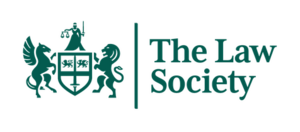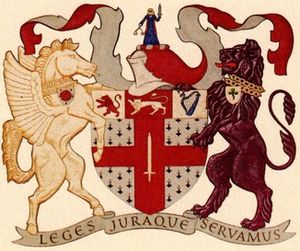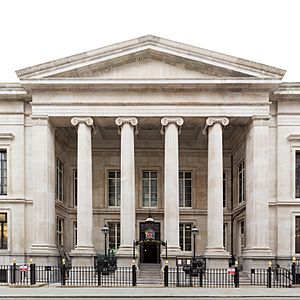Law Society of England and Wales facts for kids
 |
|
| Formation | 2 June 1825 |
|---|---|
| Type | Professional organisation |
| Headquarters | 113 Chancery Lane London, WC2 |
|
Region served
|
England and Wales |
|
President
|
Nick Emmerson |
|
Chief Executive
|
Ian Jeffery |
The Law Society of England and Wales (also known as The Law Society) is an important group that represents all the solicitors in England and Wales. Solicitors are lawyers who give legal advice and help people with legal problems.
The Law Society helps solicitors by offering support and training. It also helps to improve laws by giving advice to the government. When new laws are being discussed, the Law Society is often asked for its opinion.
The Society was started in 1825. Its main building, called The Hall, is in Chancery Lane, London. It also has offices in Cardiff for Wales and in Brussels for European Union law.
Every year, a new president is chosen to lead the Law Society for one year. The current president is Nick Emmerson.
It's important to know that the Law Society only deals with solicitors. Another group, called the General Council of the Bar, looks after barristers in England and Wales. Barristers are lawyers who often represent people in court.
Contents
History of The Law Society
The Law Society began in 1823 as the London Law Institution. Many solicitors in London wanted to improve their profession. They aimed to set clear standards and make sure everyone followed good practices.
In 1825, the word 'London' was removed from the name. This showed that the group wanted to help solicitors all over the country, not just in London. The Society was officially formed on 2 June 1825.
In 1831, the Society received its first special permission from the King or Queen, called a Royal Charter. Its name became very long: "The Society of Attorneys, Solicitors, Proctors and others not being Barristers, practising in the Courts of Law and Equity of the United Kingdom."
A new Charter in 1845 made it clear that the Society was an independent group. It worked to support the legal profession, much like other professional clubs. In 1903, its name was shortened to "The Law Society."
A big step forward happened in 1922 when women were first allowed to become members. In 2013, a group called the Association of Women Solicitors joined with the Law Society. This created a special division for women lawyers.
How The Law Society Handles Complaints
The Law Society has always worked to ensure solicitors are honest and professional. In 1834, it started taking action against solicitors who acted dishonestly. By 1907, it had a special committee to deal with problems. It could also check solicitors' accounts and issue yearly permits to practice.
Later, in 1983, the Society created an office to handle complaints about solicitors. Today, serious complaints about how solicitors behave are handled by the Solicitors Regulation Authority (SRA). If someone is unhappy with the service they received, they can complain to the Legal Ombudsman.
Training for Solicitors
The Law Society has also played a big part in training new solicitors. In 1860, a law allowed the Society to create a system of exams. This helped make sure all solicitors were properly qualified.
In 1903, the Society opened its own Law Society School of Law. This school later became the College of Law, a well-known place for legal studies. By 1922, all new solicitors had to complete a year of academic study.
How The Law Society Regulates Solicitors
Over time, the Law Society's roles changed. It used to both represent solicitors and regulate them. Following a review, these two jobs were separated.
Now, if you have a complaint about a legal service, you go to the Legal Ombudsman. This office handles complaints against many different legal professionals, including solicitors and barristers.
The group that regulates solicitors is the Solicitors Regulation Authority (SRA). The SRA is part of The Law Society, but it works completely on its own. It makes sure solicitors follow the rules and standards.
There is also a group called the Legal Services Board. This board oversees all the different groups that regulate legal professionals in England and Wales.
The Hall of The Law Society
The main building of The Law Society is called The Hall. It is located at 113 Chancery Lane in London. The building was finished in 1832 and is considered a very important historical building.
The original architect was Lewis Vulliamy. Later, an extension was added between 1902 and 1904, designed by Charles Holden. Besides housing offices for the staff, The Hall is used for conferences and special events. Parts of the building can also be rented for private events.
Standard Conditions of Sale
The Law Society creates something called the "Standard Conditions of Sale." These are a set of clear rules for buying and selling homes in England and Wales. They are like a standard contract.
These conditions help create legal rights and duties for both the buyer and the seller. The most recent version was published in 2011 and updated in 2018. Most home sales in England and Wales use these standard conditions.
See also
- Law Society Gazette
- Solicitors Regulation Authority
- Legal Complaints Service
- Law Society of Scotland
- Law Society of Northern Ireland
- Lexcel
- Cambridge University Law Society



